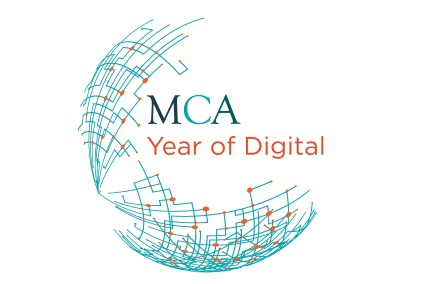Shortly before we all disappeared for summer holidays, I had the pleasure of attending the MCA Annual Debate: Our Digital Future. Among the panellists were tech entrepreneurs, consultants, and one (as it transpired later) outgoing government minister. It was a well-attended and lively discussion, and launched the MCA’s Year of Digital.
The MCA had done some research. As well as asking the audience to express its views as e-votes during the evening, we were provided with a snapshot of contemporary thinking among corporate leaders about the reality of a digital business world.
A very significant 94% said that Digital was important or very important to their business, and although a decent number acknowledged that it was a strategic area for which the CEO and board had responsibility, still 39% seemed to see it as an unconnected silo to be shunted off into the sole care of the CIO. While 93% said they understood Digital well or very well, it is possible that their extended answers belied that claim: “Use of mobile and other technologies for competitive advantage” and “Technology as a medium” were encouraging; “Anything containing a computer chip” and “Done with the fingers” less so.
Amid all this, I felt that some of the comment, if not from the panel then from the younger contributors from the floor, drew pictures of digitally lagging senior executives: “men aged 45-55” was a demographic highlighted more than once. I think that’s only true in a limited, but important, sense. Let’s be clear about our terms.
I am such a man aged 45-55, and have sat on, and advised, various boards. People of my generation were entering the workplace as bright young early-adopters just as the Personal Computer was displacing the dumb terminal; we were climbing the greasy pole as Web 1.0 emerged and then spluttered at the turn of the millennium; saw our careers burgeon as Google went from search engine to global behemoth; and eyed partner or board status as heavy users of the mobile intelligence and social media tools that have changed the 21st century world in so many ways already. This path, I would say, is typical of my academic and professional cohort. (A far cry from the day in 1994 when the then-chairman of a commercial property firm proudly and rather dismissively told me – young and tech-savvy marketing consultant as I then appeared – that he had no idea what a PC was, “besides a bobby on the beat”).
So mine is not a non-digital generation; but it’s fair to say we might not be a deep-digital one. For us, digital tools are just that: tools – of speed, productivity and effectiveness. We spend money on them. We pride ourselves on having the latest versions. We absorb them into our lives. But, compared to fast-movers in their twenties, are we really absorbed in Digital? For them, business as usual is putting information out or collecting customer data as a game-based app; communicating live corporate information across time zones, immersively and co-operatively, using telepresence and 3D graphics; getting instant but ephemeral responses on Snapchat, Pandora, Vine or whatever is next; replacing surveys with crowdsourcing; and scarcely ever producing a long-form written report in the way we understand it today, when there are so many new media to disseminate and persuade.
So it is not what Digital is, but what Digital means for the shape of business, that is a concern.
MCA members d’un certain age, being a resourceful and forward-looking bunch, will doubtless look to embrace the changes as we have always done with each previous wave of technology. Part of that adjustment will involve making full sense of the implications for the corporate changes that deep-digital era now ushers in. The panel did touch on this at the debate. The way, for example, that professional services experts such as lawyers or management consultants sell their time – indeed the very way they might spend their time – is changing; but the firms they operate in might not yet be equipped to comprehend, still less accommodate, the changes.
A £500/hour City law firm that has always charged handsomely for document review, legal research or litigation support today faces competition from limited companies (not partnership firms) who will use processing and telecommunications technology to do these much faster and cheaper, and use digital resources like e-discovery to do low-value-added work for a fraction of the traditional cost. (Professors Steven Mayson and Richard Susskind have, in their different ways, made much of this.) The management consultancy that once made millions in complex system integration contracts (a dark and impenetrable art to so many clients that they were pleased to delegate it for decades), now finds that the very systems it was integrating, exist today as on-demand cloud-based solutions, or smart phone apps, and scarcely need integrating at all – at least not in the same heavy-duty sense.
So the challenge is for the traditional professionals to build value specifically for that part of the operation that cannot be digitised and thereby commoditised: the part that justifies their years of expensive education and training, and their firm’s heavy investment in them.
This throws up two distinct problems.
First, many lack the skills to move away from the technical towards the interactive. By which I mean, their communication skills often lag behind their subject matter expertise. At the risk of making enemies among the many lawyers, management consultants and accountants whom I respect and regard as friends, I should perhaps say that I have it on good authority from industry insiders of all three professions, that the very last and least thing they ever teach or train them to do in any depth is sell, negotiate or communicate. And yet, those are the very skills that they will need, both to make the persuasive case for the firm’s differentiation as Digital makes some of their work a low-cost commodity, and to implement the higher value work which will often require client communication skills that reach far beyond the technical advice which has always been their default.
That ought to be a boon to companies like mine who help them to do these things, and in essence it is. But the very nature of Digital throws up a potential roadblock for us that management consulting firms will recognise too. And this is the second of the problems – probably a controversial one.
Many of our businesses, or at least revenue streams within our businesses, are founded on original Intellectual Property. It might be a consulting model or methodology; it might be a product or solution developed in the course of meeting a particular client need that you have subsequently made generic and taken to market; or it might – as in our case – be the research and tools that underpin the training and reinforcement we deliver.
For many years, while protecting it wasn’t exactly easy (20 years ago we used to retrieve lookalike materials from waste bins at training centres and take the plagiarists to court), Digital has complicated the task immeasurably. It has done so physically: copies of materials circulate on the internet and grainy impersonators of our trainers surface on YouTube. Worse, though, it has done so morally and politically.
The very generation that will do most to drive Digital forward to the benefit of economic future, is the same generation that now has at best a questioning, and at worst a dismissive, approach to IP. It is the generation that has developed programs for open source environments; has seen work by Creative Commons self-consciously marked “No Rights Reserved”; has retweeted the retweeted retweets of the PDF of an academic paper that was once reserved for subscribers, or shared a photo of an FT article that sat behind a paywall. And so some people are now genuinely affronted by the notion that a thing of value should have ….well…a value.
I do not condemn; but we cannot deny that it presents a problem to business models in many industries (of which software, music and book publishing are only the most obvious). It stands to affect all of us who make investments to produce things, and who therefore require to see a return (protected in some way) on those investments if we are to bother doing them again. That’s the key thing that Digital is changing and challenging, and which current leaders may not possess the skills, knowledge or imagination to resolve.
John Seely Brown and Paul Duguid foresaw this problem in an excellent book “The Social Life of Information”, published in the year 2000, when the internet was only beginning to turn things upside down. Having examined the question, they concluded: ‘It’s easy for people to dismiss as residual, institutions that have a good deal of dominating life in them. Some lawyers, for example, have promoted the idea of a “law of cyberspace”. But there’s little reason to believe that the old-fashioned law of material people and places has exhausted its writ yet.’ They might still make that argument today – but for how much longer?
Today’s professional leaders, then, are not short of enthusiasm for the sparkly toys of the digital age. The MCA survey shows it and our career histories underline it. But that very adoption and encouragement of all that is new and programmable has created more than one sticky conundrum which it will fall to the next generation to solve.
Written by David Freedman, Associate Director at Huthwaite International, as part of the MCA Year of Digital.


